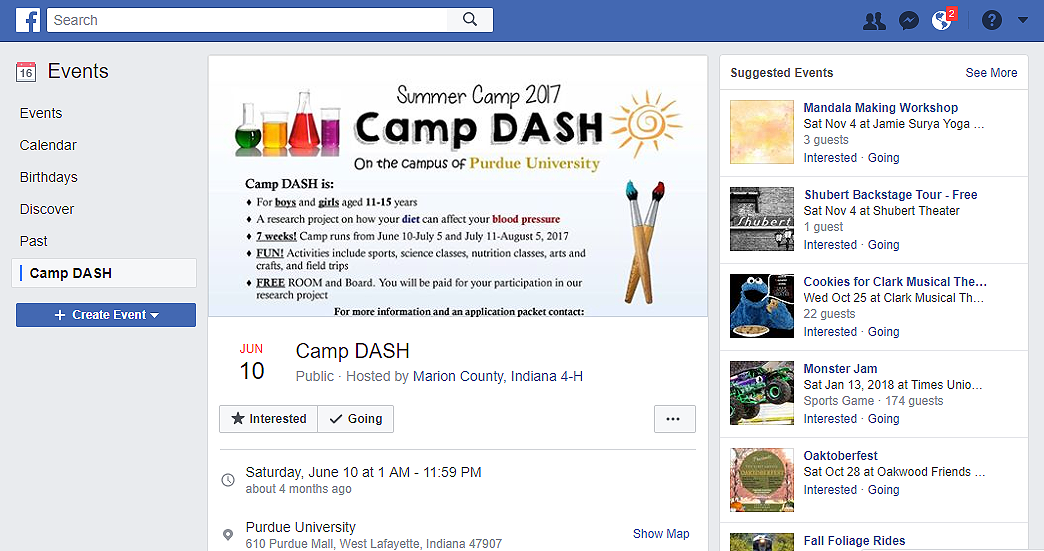Purdue University Mounted a Child Nutrition Study. It Went Very, Very Wrong.
On July 18, an adolescent girl participating in a camp-like nutrition study at Purdue University went to the bathroom at the school’s Tarkington Hall dormitory to take a shower. Soon after, her peers told her there was a video of that shower on social media. The events that followed eventually shut down an $8.8 million research study funded by the National Institutes of Health (NIH) and left one of the nation’s top research institutions circling the wagons as it scrambled to investigate what had gone wrong.
The girl was one of 78 participants in a study called Camp DASH — short for Dietary Approaches to Stop Hypertension — which was being led by Purdue’s Department of Nutrition Science. Researchers, assessing the effects of a low sodium diet on 11- to 15-year-old boys and girls with elevated blood pressure, were set to host the children in campus housing for seven weeks over the summer.

Dr. Connie Weaver was the principal investigator for the study. “I accept responsibility for events that occurred at Camp DASH,” she said this week. “The safety and security of research participants always comes first.”
Visual: OSU/Flickr/CC
After the shower video was reported to police in mid-July, the Tippecanoe County Prosecutor began looking into several additional allegations of crimes among the adolescent study participants. At the same time, University President Mitch Daniels shut the study down two weeks early and launched a months-long investigation led by the university’s vice president for ethics and compliance, Alysa Christmas Rollock.
Rollock’s investigation, released this week, shows more than 30 incidents of threats, violence, or sexual abuse among the study participants, many involving calls to campus police. (Two participants were arrested in the first few days of the study.) She also found several instances of non-compliance on the part of the study’s principal investigator, or PI, Connie Weaver, that may have contributed to unsafe conditions for the minor participants. Rollock also pointed out various conflicts of interest inherent in the study’s design.
In response to the university’s investigation, the remaining three summers of the study have been canceled and all of the collected data will be thrown out. The university’s biomedical institutional review board (IRB) stated in a letter last week that it will not review any further study applications submitted by Weaver until she submits a “comprehensive remediation plan,” which includes training and oversight by an outside mentor.
Weaver did not respond to repeated requests for comment for this story, but in a statement released on Tuesday, she said “I am deeply saddened by the instances that caused Camp DASH to end early. As the principal investigator, I accept responsibility for events that occurred at Camp DASH. The safety and security of research participants always comes first.”
Rollock’s report recommends that any employee who failed to follow university protocol should be required to complete “remedial education and/or be disciplined for such noncompliance.”
So far, there’s been no delineation by Daniels about whether this will happen or to whom. In an email message Brian Zink, a spokesman for the University, only reiterated the university’s new protocols for future studies like Camp DASH, and new rules governing work done by Weaver.
But the internal investigation, police records, local reports on the shutdown over the summer, and interviews with both university staff and some of the families involved — several of whom requested anonymity for fear of either official reprisals or backlash within their communities — paint a picture of a research study that, despite multiple levels of vetting, was poorly structured, inadequately overseen, and undermined by deliberate cost-cutting. Several participants were removed at various points over the six-weeks leading up to the shutdown, and campus police responded to multiple calls for assault, sexual abuse, and threats to use deadly weapons, in addition to the shower video incident.
The university’s own investigative report and the decisive cancellation of the DASH study last week culminates a tumultuous four months for prestigious Purdue and the surrounding community. But even with the investigation completed, the collapse of Camp DASH leaves behind lingering questions about how adult researchers and other university personnel could have allowed the study to spin so wildly out of control, and whether further fallout is forthcoming — at Purdue and beyond.
“The Purdue study and the internal investigation raise several issues about the role of the IRB, the human research protection program, and the [vice president] for research,” said Karen Maschke, an expert on the ethical and legal issues related to human-subjects research and a member of the Hastings Center, an independent interdisciplinary research institute, “not only at Purdue but at other universities as well.”
According to police reports and the university’s internal report, an undergraduate counselor indicated to investigators that on June 20, not long after the launch of the study, Weaver was notified of reports that a camper had inappropriately touched other study participants. The police report indicates that the offending camper had been promptly removed from the program, but it remains unclear whether camp staff reported this incident — or any others — to the Department of Child Services, which is required by Indiana law.
The university report also indicates that in addition to sexual harassment, Weaver was aware of “violent actions of a male participant against other participants,” including an incident where a child received second-degree burns, but that she did not report these incidents to the university’s Institutional Review Board until July 5, 2017.
The report indicates that Weaver may have had reason to withhold reporting until July 5. After two incidents of violence in the first week of the study, campus police voiced deep concern about the safety of the participants, and the university IRB informed Weaver that if there were another violent incident before July 5, they would suspend the study.
According to the report, on June 30, Chief John Cox, head of the Purdue University Police Department, contacted Howard Zelaznik, then the school’s associate vice president for research, to recommend ending the camp and sending all of the participants home. “[I]t is now my position there is an imminent threat to the health and safety of the children attending Camp DASH,” he wrote. Cox later stated he could support the continuation of the camp if changes outlined by Weaver were put in place.
But as Rollock’s report concludes, the problems continued. “Timely reporting of incidents was haphazard and in most instances, did not comply with university policies and procedures,” her report states. “There is also a question as to whether reporting in accordance with state statutes regarding suspected child abuse and neglect were satisfied. This report will not analyze this issue due to deference to law enforcement authorities.”
Failure to comply with the state’s mandatory reporting law is considered a misdemeanor, punishable by up to 180 days in jail and a $1,000 fine, but the Tippecanoe County Prosecutor’s office did not respond to multiple queries about whether any adult involved with camp DASH is being investigated.
As to whether the adults on hand understood the law and its requirements, the report suggests that they should have — in part because the researchers running the study indicated to the IRB that all study personnel were trained in these matters, including directly by police who came to a week-long training session prior to the start of camp.
The Rollock report, however, suggests this was not the case. According to the investigation, there were several inconsistencies between the study design that Weaver submitted and what actually unfolded as the program got underway. Only seven of what was reported to be 132 people staffing the study — which included everyone from counselors and lab workers to food preparation staff — had background checks completed, for example. There was also no registered nurse on staff to distribute medications, and oversight of the participants was generally much less thorough than initially indicated to — and approved by — the IRB, as well as to parents who enrolled their children.
One Greenwood, Indiana mother, who spoke to Undark but asked not to be named, said that when she dropped her 12-year-old son off at Camp DASH in June, she felt normal “first day of camp jitters.” Her biggest concern at the time was that her son might not like the food — a reasonable worry since the study would be controlling their diets. Now she is waiting to hear whether the boy will be formally charged on 13 allegations involving incidents with other campers — problems she said she never heard about until almost two weeks into the study, when she received a late-night phone call from Weaver, who told her to come get her son right away.

The mother is careful not to minimize the behavior of her son, whom she said was adopted, along with his sister, by her family after years in foster homes. “He does need to realize the seriousness of the matter and that his actions have consequences,” she said.
But the mother also added that she felt things could have been dealt with, and perhaps de-escalated, much sooner, particularly given that her husband had visited the campus two weeks after dropping off their son. During that family visit day, all was apparently fine. Three days later, the boy was kicked out. “I just feel like some of the communication was kind of lacking.”
The mother said that Weaver, who has a long record of successful study camps with adolescents dating back to 1990, did not describe the problems with her son over the phone, and that the two women did not speak at all when the mother arrived at midnight to collect her son. She also recalled that neither the boy, nor the counselor sleeping down the hall, were aware that night that the boy was being removed from the camp, though Weaver did later agree to speak to the boy’s therapist, the mother reported.
Still, the mother says she remains confused as to why it took so long for Camp DASH personnel to intervene — and loop her in — on any trouble involving her son.
“How did everything go from ‘Everything’s okay’ on Sunday,” she said, “to ‘We’re ready to have him arrested on Wednesday?’”
The work Weaver has contributed to nutrition research using a camp-like setting has helped put her and Purdue’s Nutrition Science Department on the map. She’s highly celebrated, for example, for a previous study called Camp Calcium, which examined the way adolescent bodies absorb and utilize calcium. This research directly contributed to current federal dietary calcium recommendations for adolescents.
In that sense, it was not surprising that a study application she was a part of would be approved by what is arguably one of the most rigorous processes for the approval of the use of human subjects. “The trial design was peer-reviewed at NIH prior to funding,” the NIH National Heart Lung and Blood Institute (NHLBI), which funded the study, said in a prepared statement, “and was then reviewed and approved by the Camp DASH Steering Committee, the Purdue Biomedical IRB, and the NHLBI-appointed Data and Safety Monitoring Board (DSMB).
“The DSMB included experts in conducting adolescent/child dietary studies,” the institute added.
Nominally, those Camp DASH leaders were Weaver and Berdine Martin, a Purdue research scientist who also sits on the university’s IRB. They also worked closely with one of Weaver’s doctoral students who goes unnamed in the report.
One former Camp DASH counselor who asked not to be named for fear of running afoul of university leadership, said a handful of “head counselors” answered to these lead researchers, and that they primarily managed data entry and data collection details. The head counselors, the former counselor said, were rarely involved in day-to-day activities with the participants, which was left to a fleet of undergraduate student workers. The report suggested that some of these counselors may have engaged in inappropriate behavior with some of the child participants.
According to the university’s investigation, a total of 70 counselors and head counselors staffed the study, although both the former counselor who spoke to Undark, as well as social media postings from as far back as February — used by university representatives to recruit study employees — indicate the number of counselors may have been as low as 40.
The sleeping arrangements were set up in Purdue’s Tarkington Hall Dormitory. Adolescent study participants were paired by similar age and gender in each dorm room, while one undergraduate college student counselor of the same gender slept in his or her own room down the hall. Staffing was lighter at night with sometimes only three counselors on staff for 78 participants, according to the Rollock report.
This arrangement struck at least one outside expert consulted by Undark as odd.

Even if the NIH approved the trial design for the Camp DASH study, they would have relied on the university’s IRB to work out the details for the protection of study participants, said Celia Fisher, an ethics professor at Fordham University and director of the school’s Center for Ethics Education.
Fisher, who has spent several decades working on issues of research ethics involving vulnerable populations, and who chaired the creation of the current American Psychological Association ethics code, said that in order for this study to be approved by the university IRB, she would have expected the gold standard in counselors. “To have a sleepover camp for young teenagers supervised by 18 to 21-year-olds who do not have an adult supervisor there monitoring,” she said upon learning the counselors were primarily undergraduate students, “I can’t even.”
The former counselor, who only worked day shifts, said the week of pre-study training before the camp began focused primarily on accurate data collection during meals. There was also HIPAA training, and a visit from campus police and the fire department to discuss health and safety on campus. The counselor said there was no training on how to manage behavior.
The counselor also affirmed the Rollock report, saying there wasn’t much structure to daytime programming and that the adolescent participants were often bored and beset with downtime. Small groups of participants often waited for long periods while each was physiologically tested. “We were in, like, classrooms where there were no windows or anything…and you had to stay in this room for like 4 hours.” Another Purdue employee who worked with the participants in a daytime program said the camp seemed chaotic. When the participants arrived for the program, the undergraduate counselors “were not engaged with the children when we were having activities,” the employee said. “They were just off in a corner with their phones.”
Undergraduates were not prepared to handle such supervisory roles, the employee added. “You can’t just decide that you’re gonna work with troubled youth. There’s a lot that you really need to do and there’s a lot of things that you need to learn. Things like, how do you do non-violent communication? How do you de-escalate a situation?
“These kids were not trained. They were not at all ready,” the employee added. “And that goes squarely back to the university and the PI.”
In response to Rollock’s recommendations, Daniels wrote in a letter to the university community that all future studies with the “unique characteristics of the DASH study” will conform to standards established by the American Camp Association, the Association of Camp Nursing, and the Higher Education Protection Network. He added they will also require a qualified camp administrator tasked with camp operations and management.
It’s not clear in Rollock’s report or in Daniels’ letter why the university’s Institutional Review Board didn’t have those requirements in place already. It’s also not clear why the IRB wasn’t independently confirming assertions made by Weaver, including that her staff had completed background checks, or that there was a registered nurse on staff to disseminate medications. Instead, the people disseminating medications were a nursing student and someone who had an EMT license in the 1990s, according to the internal investigation. The internal report mentions briefly that one of the head researchers in the study, Berdine Martin, also sat on the IRB, but makes no recommendations regarding the conflict of interest inherent in those simultaneous roles.
Fisher says that not all IRBs are created equal, and that they vary significantly from institution to institution — primarily because there are no federal regulations requiring that all members be scientists or know anything about scientific ethics. Instead, IRB members are generally pulled from the faculty pool and are not paid for this committee work, Fisher explained. They also have a diverse range of expertise that is not always suited to every study being reviewed. “They may try very hard to apply ethical standards,” Fisher said, “but if they have no understanding of the type of research that’s being conducted, then they may not be able to identify all the risks and benefits of the participation.”
Fisher also says while most members of university Institutional Review Boards are genuinely interested in the protection of human subjects, “the problem is the lack of expertise and the lack of funding that they get.”
It’s difficult to know where Purdue’s IRB falls on the continuum. But there are no specific recommendations in the published internal review regarding changes to the board.
The report also makes clear that the accumulating costs of staff and supplies for the expansive study had made Weaver’s budget increasingly tight. “This led to an environment of cutting costs,” the Rollock investigation stated, “wherever possible.”
Such cost cutting included housing the participants in a non-air conditioned residence hall, which investigators said saved $25,000.
Maschke of the Hastings Center said that while there are certain federal regulations governing IRBs, “expecting an IRB to task someone with confirming that a [principal investigator] has fulfilled all of the requirements of the approved protocol” is not common practice.
“This should not have to be ‘whistleblower’ scenario, but it often turns out that way,” Maschke said in an email message. “Since IRBs typically don’t monitor studies while they are being conducted, the burden is on someone to report something – and if the PI is one of the problems, then there has to be a known (and protective) process in place to report concerns. And there has to be a written policy about how institutional offices will respond, when, to whom they will respond and report, etc.
“What’s glaringly missing from the Purdue internal report is any mention of these issues.”
Just what the full implications of the failed study will be for university researchers and other Purdue personnel remains to be seen. In the meantime, families of young alleged victims and perpetrators across the region are grappling with the fallout of a scientific undertaking that, by virtually all accounts, failed to adequately ensure the well-being of child participants.
Tippecanoe County Chief Deputy Prosecuting Attorney Kristen McVey told Undark that it’s been difficult to coordinate so many investigations between the three states from which the young study participants were drawn, but that they plan to complete their investigations and make formal charges in the coming days.
This story may be updated with additional input from sources as it becomes available.
Amy Gastelum is a writer, radio producer, and registered nurse based in Indianapolis, Indiana. She has reported for Public Radio International’s “The World,” NPR, and Guernica Magazine, among other publications.











Comments are automatically closed one year after article publication. Archived comments are below.
!Why ANONYMOUS, use your name. You’re part of the problem!
I question who sets up a Summer Camp with almost 100 Teenagers with a ratio at night of one Staff member for 26 Student Subjects. Who let that fly, also when you talk about staff members supervising student subjects they should be adults, not Undergraduate Students with no Counseling training. Plus, what kind of Sumner Camp does not plan daily activities to keep the students busy, we all know what to
much down time can be like for your average teenager, let alone 70 some teenagers! The parents of these students in my opinion, could possibly take legal Action against the PI and Purdue University for not making sure all the boxes were checked before Camp Dash even got started. Who knows what the long term effect of six weeks in those condictions did to each of the participants.But it sounds like Consent Forms were destroyed with all Data, which should never have happened. (Thinking Dr Weaver was trying to cover her tracks.) Please Purdue, do not let her do another Case Study involving Children.
@Karen Smith, re the evaluation of the participants for appropriateness in the study, the (Indiana Daily Student) IDS news.com article mentions that the woman who chose the participants, Tamara Hannon, a pediatrics professor at IU School of Medicine, “did not properly account for the adolescents’ backgrounds” (link at end of comment). Aside from that, I am aghast at this study and everything that went wrong with it. Can’t believe Connie Weaver is still employed at Purdue, based on her deceptiveness detailed in the IDS news.com article. Criminal cbarges also appear to be warranted. You can be sure her own children would never have been participants in an environment like the camp was, as surely she knows the truth of what has to have happened at prior camps, and simply the reality of children today with the breakdown of the family (yes, it is the root cause). I would never volunteer my teen to an environment like this because of how dysfunctional teens are nowadays. I’m saddened that the young people who went (and their parents), likely eager for a fun experience, have had their view of the world tainted in a way that will affect them the rest of their lives, and I speak from experience, although the specifics are different. https://www.idsnews.com/article/2018/12/purdue-iu-named-in-lawsuit-against-2017-research-study-gone-wrong
The following comment is my opinion based off
Goinformation obtained from individuals closely related to the general proximity of the Camp Dash study. There is SO much that is missing here. I heard of people who were threatened with their jobs and who was silenced and harassed for reporting issues and concerns MONTHS before the camp began to HR. A dietician was quoted as saying “you don’t cross the path of Connie Weaver or question how she runs her studies, if you want a future in the department. Even New Director Michele Foreman turned a blind eye. Add in a dietician who would do anything to get their name published with the study and greed and the lust for fame take over. Well they got their fame alright.
I now question the integrity of any Weaver lab studies. If one would dig a little deeper you would find issues with the entire BioNutrition Unit and its manager, ethics, morals and actual eduation and training of staff at the time of the study. My image of Purdue has sunk to an all time low.
Actually my belief in ANY research from Purdue will be questioned from here forward. Seems like this has been brushed under the rug. What else are they hiding that hasnt gone public and for how long?
No one has mentioned the credentials of key staff who was directly involved with monitoring blood pressures and other procedures that would require certification either, but that’s not of business…..
Prof Adrian Raine should be contacted to study this group of kids. He is at U of P in Philly. Wrote book, The Biologiacal Roots of Crime. Might have something to do with the poor kid who was adopted? As well as the underlying reasons for Connie Weaver’s terrible way of setting up the study. Was her motive abuse in guise of the study???? Sometimes the reason is that she needed a psych exam, just saying.
Thank you for sharing this issue and shining a light upon how important it is to continue to monitor all aspects of research. I imagine (as we can’t know the details) that the idea of the children running amok was not considered during the IRB review looking at how the scientific protocol would be managed. But, as anyone who has attempted to take a birthday party of teens to a pizza joint knows, it doesn’t take very long for the animals to be running the zoo!
I wonder too, what was the evaluation of the children’s appropriateness for participation in the study? Surely, one would think to evaluate prior history of requiring a behavioral therapist as was alluded to by the one mother quoted in the article, might be a reasonable disqualifier for 7 weeks away from home? Just a thought….from an ethicist… thinking this might become the next classic ethics learning case.
Really?!? You blame the research participants?! It sounds like Camp Calcium was set up correctly, while Camp DASH was not. That is not the kids’ fault. It’s the fault of the people who set up the study!
Dude. “State statues”? STATUTES.
Thanks, Nope!
“How did everything go from ‘Everything’s okay’ on Sunday,” she said, “to ‘We’re ready to have him arrested on Wednesday?’”
The article doesn’t provide the answer, but what the mom is complaining about has some very obvious answers. Most notably, “Because x happened on Monday, Tuesday, or Wednesday.”
It also could be that x occurred before Sunday, but was only found out between Sunday and Wednesday.
Where x is something like filming a girl in a shower, posting it online, or any other assault, or even just any lesser bad behavior that runs afoul of the program rules.
HIPAA, not HIPPA. Health Insurance Portability and Accountability Act.
Of course. Thanks, Leslie.
I get that there was a problem with the study and there were behavioral issues. The issue with the young girls sticks out to me the most and seems to get overlooked. A video of her in the shower was posted on the internet! That doesnt just go away. Thats something that could haunt her the rest of her life! As a parent I would want more than a simple review of the camp protocol. Someone would have to answer to me for that!
I would say that it is not a few research participants ruined the study, instead those in charge of planning what to do with the children that were enrolled. Unlike laboratory animals, teenagers cannot be caged while scientist collect their observations.
This is a loss for everyone involved, but mainly for the adolescent participants.
Interesting that by calling the study a “summer camp” the investigators were allowed to call supervisory personnel “counselors.” In Indiana a Licensed Professional Counselor must have a masters degree in counseling plus 1500 hours of supervised practice. Luckily they didn’t call the study a “hospital” and allow first year undergrads to perform brain surgery! My sarcasm is occasioned by the previous commentor, who blamed middle school age children for getting out of hand when their time was not structured. Perhaps the University should insist on IRB full board review every time children are involved.
They were never intended to be licensed professional counselors. The setup was similar to how a regular summer camp can be set up, which does not require any college experience. LPCs generally deal with the diagnosis and treatment of mental disorders rather than taking care of (supposedly) normal kids in this manner. Otherwise Boy Scout camps, church camps, or youth camps in general in Indiana wouldn’t exist because it would be too expensive
I was a lead counselor for camp calcium And I Know that during our research camp the lead counselors were very active with the participants as well as ensuring proper data collection and research protocols were followed! It is a shame that a few research participants can ruin a study and tarnish an amazing leader in the nutrition and research communities.
I don’t think its the participants fault at all. Clearly there are behavioral problems that need to be addressed, but ultimately it comes down to the fact that the PI is responsible for providing oversight for the study and she clearly was not doing that. If she had any inkling that there were violence or sexual abuse allegations from the campers, it was her duty to report those in a timely manner and make sure that the proper authorities (IRB, OHRP, etc.) were notified. She didn’t. And that’s on her.
Oh please! A protocol not followed by the PI is regulatory non-compliance. And the deceptive behavior borders on the criminal. The punishment needs to be certain and severe.